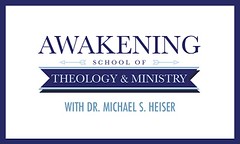by Phillip D. Collins
RaidersNewsNetwork.com -- In a recent address to the CATO Institute in Washington, D.C., Czech President Vaclav Klaus declared, "Environmentalism is a religion. It does not belong in the natural sciences and is more connected with social science." According to Klaus, this religion is purely a statist one designed to enthrone policy professionals that hope to "rule from above." Klaus asserted that this religion worked in tandem with "multi-culturalism," "internationalism," "social democratism," and other fashionable ideologies to accelerate the global tectonic shift towards "supranationalism." These contentions seem to be reinforced by the admonitions of one of the environmentalist movement’s leading ideologues: Albert Gore.
A cursory perusal of Gore’s Earth in the Balance: Ecology and the Human Spirit reveals the religious character of environmentalism. Replete with inherently religious terms like "heretical," "moral," and "spirit," Gore’s book virtually qualifies as a sacred text. However, the religion that Gore espouses is hardly amicable to Christianity. Gore assails Christianity for the purported suppression of the "goddess religion," which he contends provided humanity with a "spiritual sense of our place in nature" (260). According to Gore, those who think otherwise hold "heretical" beliefs (258).
Gore claims to be a Baptist (244). However, almost every assertion that he presents represents a departure from traditional Christian theological precepts. For instance, Gore re-conceptualizes the Godhead as God, nature, and man (255). Rejecting man’s universal position as imago viva Dei, Gore declares: "We cannot segregate the human heart from the environment ... Man is organic with the world" (21). Gore also expresses the belief that the totality of human intellect is "detached" from man and constitutes a "new disembodied mind" (251-52). This "new disembodied mind," Gore contends, possesses absolute omniscence and can "observe the movement of matter everywhere" (251-52). Such ideas are nothing new. Gore’s monistic Weltanschauung is merely the latest incarnation of the belief in an emergent deity within the immanent cosmos. W. Warren Wagar explains:
Nineteenth-and early twentieth-century thought teems with time-bound emergent deities. Scores of thinkers preached some sort of faith in what is potential in time, in place of the traditional Christian and mystical faith in a power outside of time. Hegel's Weltgeist, Comte's Humanite, Spencer's organismic humanity inevitably improving itself by the laws of evolution, Nietzsche's doctrine of superhumanity, the conception of a finite God given currency by J.S. Mill, Hastings Rashdall, and William James, the vitalism of Bergson and Shaw, the emergent evolutionism of Samuel Alexander and Lloyd Morgan, the theories of divine immanence in the liberal movement in Protestant theology, and du Nouy's telefinalism--all are exhibits in evidence of the influence chiefly of evolutionary thinking, both before and after Darwin, in Western intellectual history. The faith of progress itself--especially the idea of progress as built into the evolutionary scheme of things-is in every way the psychological equivalent of religion. (106-07)
The "faith of progress itself" was also one of the defining pillars of the anti-Christian Enlightenment. This anthropocentric religion, which reached its nadir with the bloody French Revolution, venerated progress as the product of man’s apotheosized Reason. Goeringer elaborates upon the Enlightenment view of progress:
Reason, working upon nature, would enhance the quality of life for each and every one of the Enlightened. The Atheist philosopher Condorcet preached the doctrine of a coming Utopia, where indefinite progress would bring forth a "natural salvation" of plenty and immortality. Progress held that since the universe was knowable, enlightened man could become the subject of history rather than its object. Mankind could fashion nature to its wishes; the efficacy in shaping the natural order was limited only by time and the sheer limits, if any, of reason. (Goeringer, no pagination)
Not surprisingly, the Enlightenment also venerated nature. Goeringer states:
Nature was just that — the natural, real world. It was not the realm of the supernatural, the demonic, or the godly, but the empirical or rational "stuff" of which the universe was, and is, made. Nature could be understood through reason; through logic, scientific inquiry, and open mind of free inquiry, nature would yield her secrets. (No pagination)
Of course, there are some crucial distinctions to be made. The Enlightenment’s view of nature was not as overtly spiritual as Gore’s, although many Enlightenment thinkers did view the decoding of nature’s secrets as analogous to divine revelation. Moreover, while Gore promotes a doctrine of emergent deity, his religion seems to eschew progress in favor of an anti-industrial, agrarian feudalism. Thus, modern day Enlightenment proponents like the Randian Objectivists clash violently with Gore’s environmentalism. These distinctions aside, there are some ideational commonalities that share an overall aversion for Christianity.
Gore's vision is purely global in scope, as is evidenced by his proposed "Global Marshall Plan." This hypothetical policy would stipulate the formation of a "trust fund" to generate revenue for environmentally sound products (349-50). The money for this fund would be confiscated from offenders of "mother earth," namely those segments of industry that are guilty of increasing carbon dioxide emissions (34-50). Further delineating his framework for an eco-theocratic state, Gore proposes a form of universal education that will "monitor the entire earth" (357). Gore’s hypothetical state would also mandate "an annual tree census" (357).
Given the supranational character of Gore's proposed social and political machinations, the claims of Vaclav Klaus certainly gain more credibility. In his address to the CATO Institute, Klaus specifically identified the world’s gradual migration towards global governance as a threat to liberty everywhere (Mooney, no pagination). Klaus contended that environmentalism was providing the ersatz religion for a gradually developing superstate (no pagination). If he is correct, then Gore qualifies as the high priest of the emergent world theocracy. Gore’s film, An Inconvenient Truth, enjoyed an international audience and won an academy award at the Oscars. Evidently, the evangel of the new ecclesiastical authority is spreading. Heretics, beware.
Sources Cited
Goeringer, Conrad. "The Enlightenment, Freemasonry, and the Illuminati." American Atheists 2006
Gore, Albert. Earth in the Balance: Ecology and the Human Spirit. Houghton Mifflin, NY: 1992.
Mooney, Kevin. "Environmentalism Religion Rather Than Science, Says Czech Leader." CNSNews.com 12 March 2007
Wagar, W. Warren. H.G. Wells and the World State. New Haven, CT.: Yale UP, 1961.
Wednesday, April 11, 2007
Environmentalism: The Religion for an Eco-theocratic Superstate?
Posted by
Steve McHenry
at
1:21 PM
![]()
Labels: Al Gore, An Inconvenient Truth, Blog, Deception, Environmentalism, Evil, Evolution, Humanism, Illuminati, New Age, Phillip Collins, Religion
Subscribe to:
Post Comments (Atom)









No comments:
Post a Comment